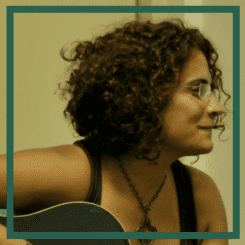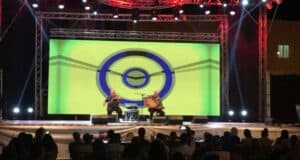
As a Palestinian Christian and citizen of Israel, Shadia Qubti has embodied many identities as she has grown from the role of student to advocate and peacemaker. Originally from Nazareth, one of the largest cities in Israel with a Palestinian population, Shadia grew up in the Baptist church, with her faith always playing a large role in her identity. She describes her faith during her formative years as giving her a place of belonging, especially when growing up with the identity of a “minority of a minority” as a Palestinian Christian and citizen of Israel.
Nazareth was largely distant from the Israeli-Palestinian conflict, so it wasn’t until beginning university in Haifa that Shadia became more exposed to the conflict as she began to notice how she was perceived by her fellow classmates. Despite being an Israeli citizen in a country that has portrayed itself as a home for people from many backgrounds, the lack of the common denominator of having a Jewish identity lead her to feel disconnected from the larger student body.
This feeling was heightened upon completing university and moving to Jerusalem, where the separation between the Palestinian population and the Israeli Jewish population was felt more acutely. Shadia describes having to navigate knowing her place within a series of identifying questions she was continually asked—was she Arab or Jewish? Was she Christian or Muslim? When not part of the group that society at large portrayed as “good,” Shadia describes a sense of constant devaluing, which had an ongoing effect upon her daily life. In Jerusalem, the Holy City, Shadia says she felt furthest from her faith.
In Jerusalem, the Holy City, Shadia says she felt furthest from her faith.
During this time, her spiritual life entered a process of deconstruction and evolution, determining how her faith was to play a role in her identity. Shadia set out to define her role in relation to her contribution to her community. She began to view her work specifically from the lens of gender, asking where women leaders were: within the church, the professional work setting, and in work to resolve the conflict.
In examining the influence of female leadership within the conflict, Shadia found that women were typically portrayed as victims, which diminished their potential in terms of constructive peacemaking and reconciliation. Women, she says, were missing from the public discourse. Shadia began to examine ways in which women could be invited to participate in the public sphere and gain more recognition for their work, not just within the typically perceived feminine role of nurturers, but as leaders with the ability to inspire and bring about change.
Shadia began to examine ways in which women could be invited to participate in the public sphere and gain more recognition for their work, not just within the typically perceived feminine role of nurturers, but as leaders with the ability to inspire and bring about change.
Wrestling with these questions inspired Shadia and a group of friends to start Another Voice, a blog written by Palestinian and Israeli women, in which they explore their various experiences within the conflict and their roles as mothers, daughters, sisters, employees, and leaders. This blog provides women from different faiths and backgrounds with the opportunity to share their experiences, and explore constructive ways in which to address the conflict and their roles within it. For three years, Another Voice served as a means by which women could challenge the status quo of male-dominated leadership roles, while renewing hope in their ability to face challenges and maintain solidarity in the face of a conflict currently at a political stalemate.
Engaging in such projects has enabled Shadia to continue in peacemaking work for over a decade. While remaining within the work of addressing this conflict, she says, people undergo a transformation and must hold themselves accountable to addressing patterns of behavior indicative of withdrawing and resigning oneself to being overcome by feeling hopeless about the situation. Repeatedly asking the dangerous question of “Why bother?” can lead to feeling overwhelmed. However, being part of community-led projects such as Another Voice have enabled Israeli and Palestinian women to explore these feelings when working within areas of tension, and to find ways to work through them together and nurture one another.
This community-level work has led to exploring ways of further engagement through activities beyond blogging. Shadia is now working with co-producers on a podcast as a new platform for voices, addressing the intersection of faith and the conflict from a female perspective. It will serve as a storytelling outlet for women to share their experiences on how the conflict has shaped their lives and the role their faith plays within them. Such work, says Shadia, is empowering, because it is an opportunity to engage her passion for activism while sharing her story, and providing a platform for other women to share theirs as well. It serves as a way to improve the discussion regarding women engaging in community-level work and how they can expand their influence within it. (The podcast is set to launch in late spring of 2018; click here to be added to a mailing list for updates.)
When the conflict is addressed publicly, says Shadia, it is usually through a male perspective, portraying the male experience. By opening up the discussion through a female lens, however, Shadia and her friends are breaking down the barriers which have reinforced gender roles within the conflict itself and diminished the role of women. Discussing female experiences and their roles as leaders not only challenges the status quo within Israeli and Palestinian society, but empowers women to lead and find their source of strength from within a community of fellow female activists, both Palestinian and Israeli. It helps to move people beyond the typical labels that Shadia found so limiting as a young adult, breaking barriers to find commonality and strength within a community of voices with one common denominator: being a peacemaker.
Pray with us:
God of the universe, we ask that you would strengthen all women in Palestine and Israel seeking justice and peace for their sisters on all sides of the conflict. Please elevate their voices to those who need to hear their message. May you speak through them, spreading a sacred solidarity of sisterhood among them. Amen.
Sara Burback served as a Peace Corps Volunteer in Kazakhstan and earned her MA in International Human Rights at the University of Denver’s Korbel School of International Studies. In addition to volunteering at Churches for Middle East Peace, she works at the United States Energy Association in Washington, DC, and participates annually in Bethlehem’s Free Movement marathon in defense of the basic human right to movement. This article first appeared on Prayers for the Holy Land, and is reprinted with permission.
Join Churches for Middle East Peace June 17-19, 2018 in Washington, D.C. at CMEP’s Advocacy Summit And Still We Rise! Meet Shadia Qubti and other incredible women making peace in their communities in the Middle East.


